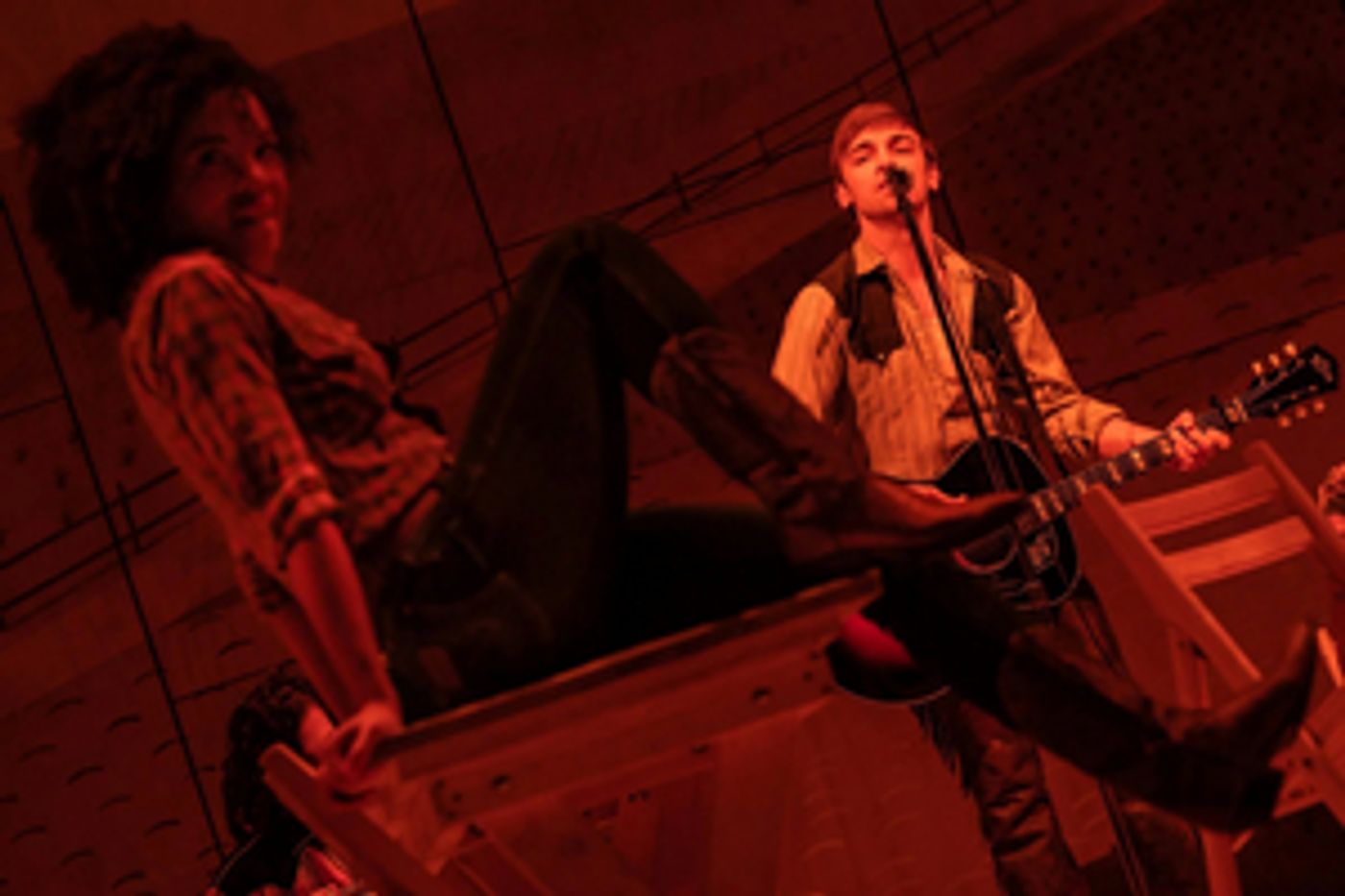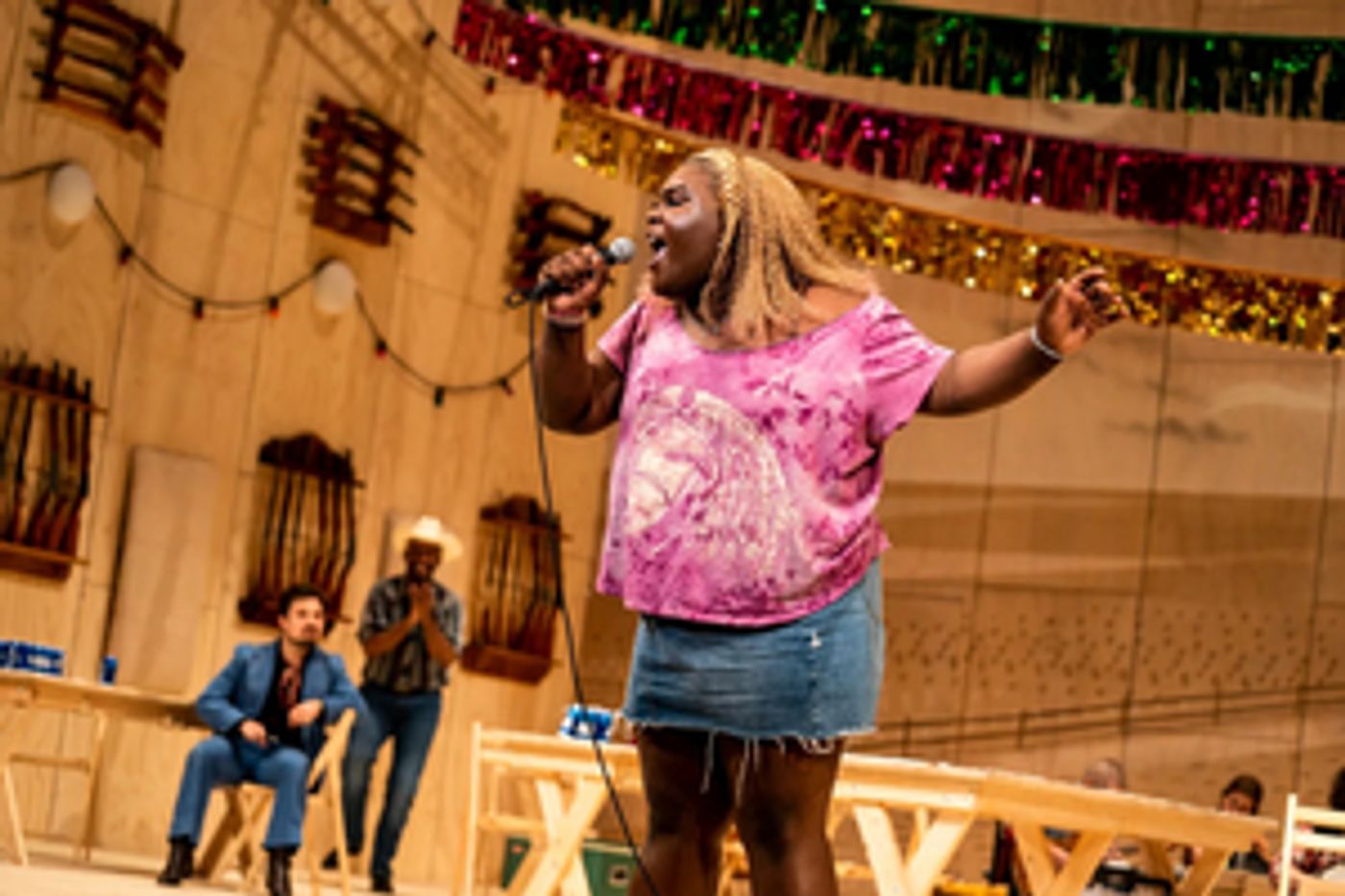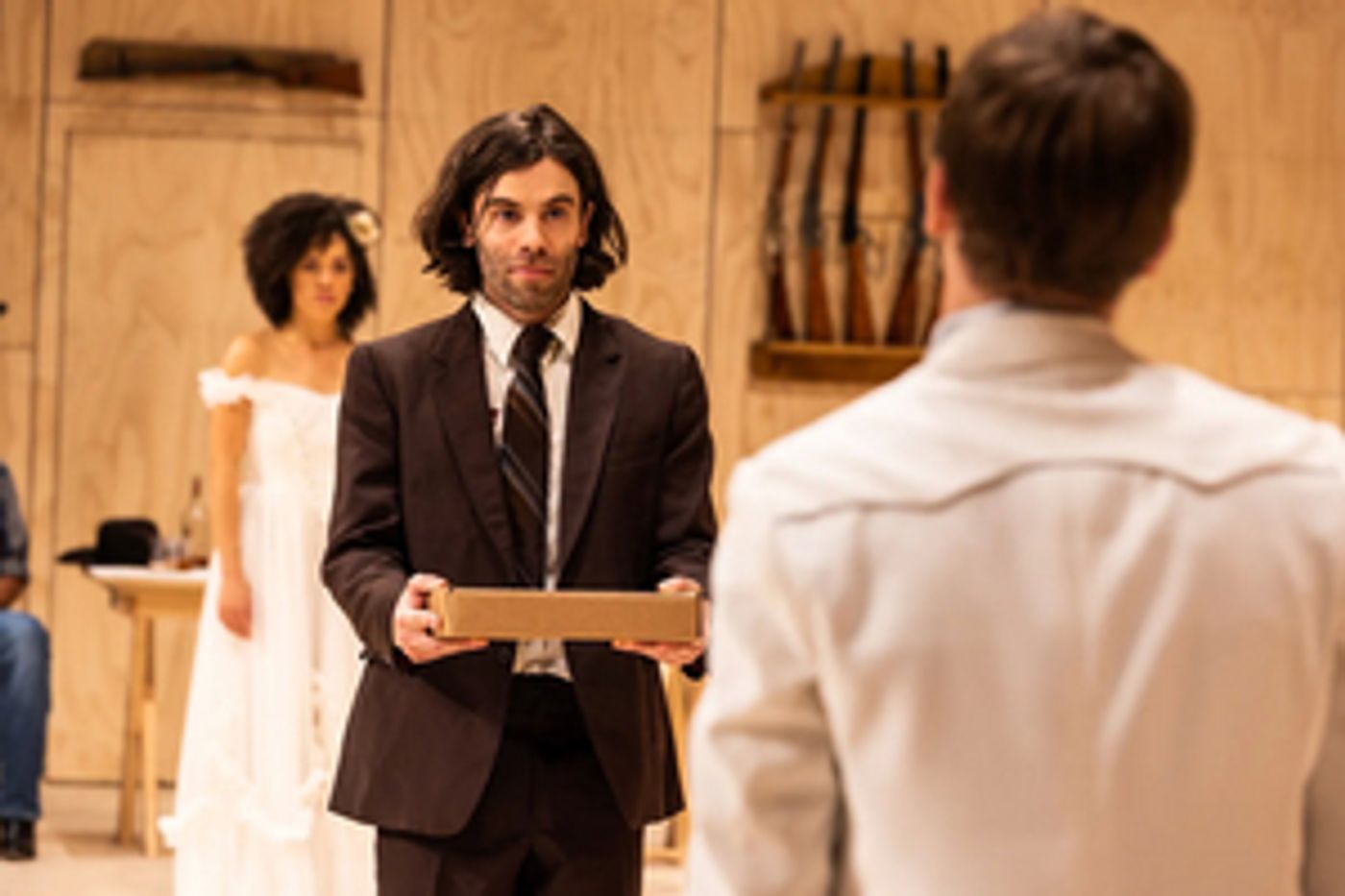Review: Reimagined OKLAHOMA! Replaces Feel-Good Energy for Macabre Spectacle at CIBC Theater
The things making the original so good were uprooted for the sake of being edgy and inventive.

Roger and Hammerstein's seminal work of musical theatre Oklahoma! has long been a favorite of those who grew up with the 1955 film starring Shirley Jones and Gordon MacRae with it's incredibly catchy company numbers and timeless message of following one's heart no matter the cost. Nevertheless, this first of musicals has faced increased scrutiny with younger generations for being old-fashioned, folksy, and traditionally white-washed- so the task of modernizing the show for a new audience was ripe for the taking. Though director Daniel Fish does just that with this Tony-winning revival, one fears that the things making the original so good were uprooted for the sake of being edgy and inventive.
The typically inspiring opening Oh What a Beautiful Morning took place not amid amber waves of grain, but in a setting that more closely resembled a classroom- harsh white lights and all. The clutter of the space clashed with the sweeping openness of the ballad. Sean Grandillo in the role of the rugged and charming Curly brought it home with his strong and soulful voice- with just a hint of country twang. Despite the newness of the entire production, Grandillo's portrayal of Curly felt familiar and comforting: his confidence, unwavering devotion, and ability to be the man of action was everything Curly is supposed to be and more.
Sasha Hutchings shone in the role of Laurey, Curly's love interest. Bringing a fierceness to this traditionally stubborn and headstrong character, she exuded strength throughout. Hutchings led the female voices in Many a New Day with aplomb, the shared work of shucking corn adding an effective and gritty touch. Little by little, Hutchings beautifully unfurled Laurey's vulnerability as Laurey learned to swallow pride, seek help- and of course, follow her heart.
One refreshing element of this Oklahoma! rendition was the newfound power it gave some of its female characters. In particular, I saw Barbara Walsh's Aunt Eller in a whole new light. Walsh's version of this stalwart leader was nothing short of enigmantic- and naturally, full of heart. Though her tough, wry persona has an inherent attractiveness to it, it's not until the final moments of this show where we see how her strength as a leader has its downsides- to the peril of the community. Walsh brought this slightly more sinister side of Aunt Eller out to play, and it was electrifying to watch.
 Just like you've never seen an Oklahoma! like this before, you've definitely never seen an Ado Annie the way Sis plays her. Explosive does not even begin to describe this actress's vivacity. Sis brought sheer power to this character typically portrayed as a ditzy flirt. Everything from body language to enunciation was delivered with utter perfection, making me look forward to Ado Annie's next scene more and more as the show progressed. Sis brought the house down with Cain't Say No- and seemed to have an unspoken "and I don't want to" as she completely owned this quality of her character. If I could replay just one song from the entire performance in my mind's eye, this would be it.
Just like you've never seen an Oklahoma! like this before, you've definitely never seen an Ado Annie the way Sis plays her. Explosive does not even begin to describe this actress's vivacity. Sis brought sheer power to this character typically portrayed as a ditzy flirt. Everything from body language to enunciation was delivered with utter perfection, making me look forward to Ado Annie's next scene more and more as the show progressed. Sis brought the house down with Cain't Say No- and seemed to have an unspoken "and I don't want to" as she completely owned this quality of her character. If I could replay just one song from the entire performance in my mind's eye, this would be it.
Adding a lightness to this otherwise heavy show, Annie's ardent admirer Will Parker was played by Hennessy Winkler. Winkler brought to life everything we already love about Will Parker: his simple mind, his big heart, and his head-over-heels rapture for Annie. Kansas City was the first joyous spunky song of the performance, Winkler leading the charge with an unabashed boldness. Will Parker's so-called nemesis, Ali Hakim was given to us by Hunter Hoffman. Hakim's seemingly scoundrel ways are sure to resonate with audiences today, as the tale of a man who feels forced into committing to a relationship is as old as time. Hoffman's effortless charm and flirtatiousness made him a heaven-sent match for this charlatan.
 One unexpected star of the show was Christopher Bannow in the role of Jud Fry. Bannow's portrayal of this unsavory character played up Jud's social awkwardness and our modern idea of an incel- you would be hard-pressed to find a millennial who couldn't name an old high school classmate that reminded them of Jud. And though Jud is a character we've long loved to hate and laugh at, suddenly- the joke isn't funny anymore. In this new take, Curly's taunting of Jud seems mercilessly cruel and sews deep pity in the audience for this character that is still so unlikable. This is one part of the re-telling that was really done well. Bravo, Christopher Bannow!
One unexpected star of the show was Christopher Bannow in the role of Jud Fry. Bannow's portrayal of this unsavory character played up Jud's social awkwardness and our modern idea of an incel- you would be hard-pressed to find a millennial who couldn't name an old high school classmate that reminded them of Jud. And though Jud is a character we've long loved to hate and laugh at, suddenly- the joke isn't funny anymore. In this new take, Curly's taunting of Jud seems mercilessly cruel and sews deep pity in the audience for this character that is still so unlikable. This is one part of the re-telling that was really done well. Bravo, Christopher Bannow!
Despite the talented group of actors, dancers, and musicians as the ones described, it's devastatingly disappointing that the whole was not greater than the sum of its parts.
Things started to take a turn for the worse with the opening of Act II's dream- or rather, nightmare- ballet. Though a mid-show ballet is not often something theater-goers look forward to, this version was downright dreadful. The music bore little resemblance to the original score with its dark intensity and grating cacophony. The lead dancer Gabrielle Hamilton lunged, thrusted, and scooted (yes, scooted) her way all over the stage for upwards of ten minutes as darkness and disturbing green lights shrouded her. Though I can make guesses as to what the dancing represented for the characters, I would be grasping at straws.
As events come to a head, the ending of this production looks and feels very different than the traditional version. It is visually violent, and the haunted faces of Laurey and Curly from the final scene are still etched in my mind. You will leave the theatre with the heaviness of the show weighing on you.
The costumes for Oklahoma! didn't so much resemble Little House on the Prairie as they did a Western saloon, but the modernization was a welcome one. As mentioned earlier, the set often felt cluttered, and the presence of all the characters onstage in nearly every scene was distracting. That being said, the musicians perched upstage throughout the entire performance was pleasant to observe as they stummed, plucked, and played through the night.
At its heart, Oklahoma! tells us about the double-edged sword of what it means to be a community- and what devastating consequences can occur if you don't belong. It reminds us to move "out of your dreams and into your heart," and paints a picture of a people that is changing along with its nation. Oklahoma! is an incredibly important cornerstone of musical theatre history, and its vital that we continue to reintroduce it to new generations- especially in a way that doesn't end in a macabre spectacle, which sadly occurred in this rendition. One could hear murmurs of "...rolling over in their graves" as audience members departed the theatre, and that's never a good sign.
I applaud the boldness and diversity of this new work while mourning the original integrity. For viewers looking to be seriously challenged, do see this new re-telling of a time-honored classic. For devotees of the original- beware!
Oklahoma! runs through January 23rd at the CIBC Theater in Chicago. Tickets can be purchased at the Broadway in Chicago website.
Reader Reviews
Videos

